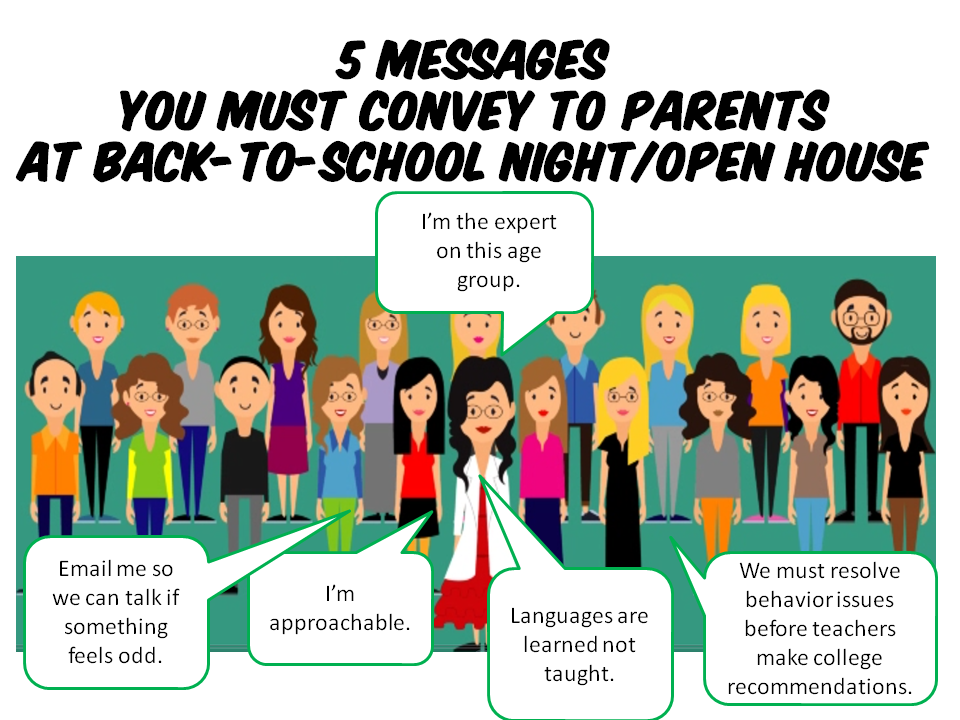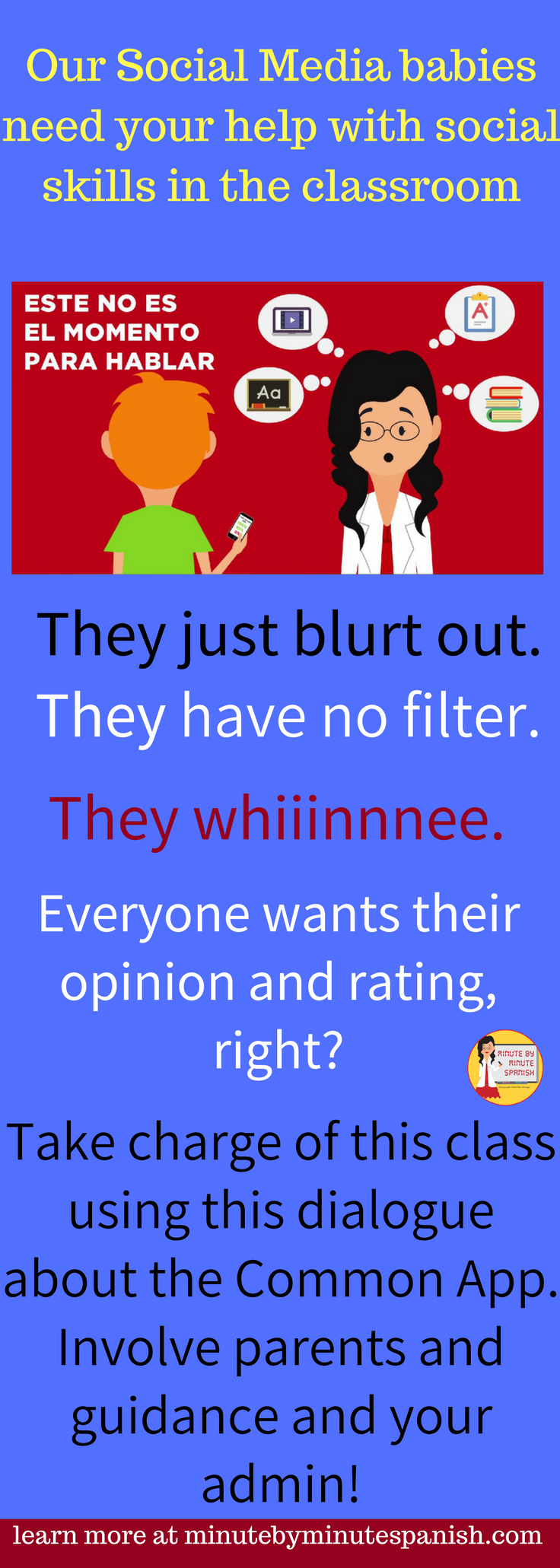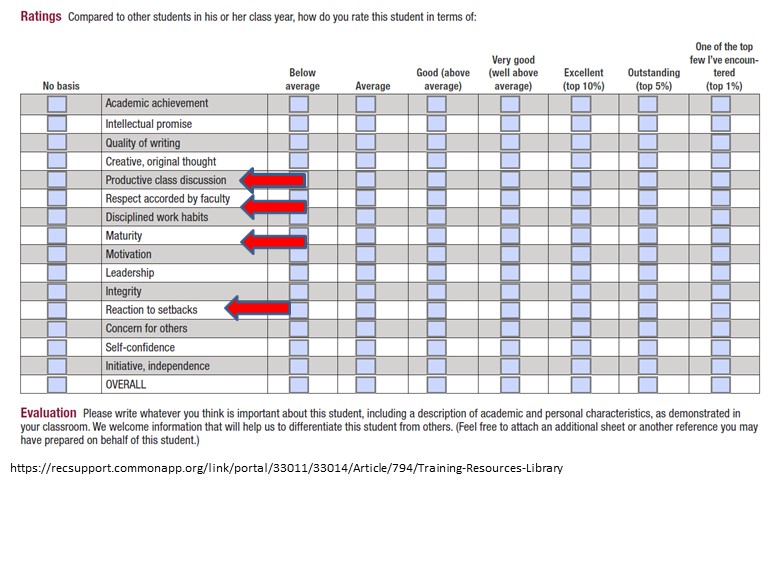Back-to-School Nights can fly by in a blur. At our school, on Back-to-School Night, teachers have 10 minutes per class with parents. Use this time wisely. Don’t squander these minutes on technical information easily conveyed in a brochure, or by teaching a lesson in the target language — you have five more important messages to convey that will improve your relationship with parents for the rest of the year.
- You want to convey you are personable, friendly, human, and that they can trust you. Later on in the year, if there is an issue, you have laid the ground work that they approach you first with a problem or a complaint, not your boss.
After a brief sketch of my background and the advantages of learning Spanish, I mention my personal experience. I tell them about scholarships I have won, and how their child can also win scholarships, based on language skills. I share when I have made more money because of my language skills. Money catches their interest! I tell them how much I love teaching seventh grade right up until February when these twelve-year-olds turn into teenagers. I wink, we have a good laugh, I ask if the teenage alien has already entered their home, I have over 200 a day! See, I’m personable!
- You must convey to them that you are the expert on this age group, compared to them. Even if you are a second year teacher throw out your statistic.
I spend a few minutes educating parents about adolescents and I assert my expertise with this age group. I tell them that in my experience of teaching more than 3,000 students in this age group, (here I pause and joke that I have the gray hair to prove it but you want it to sink in. Yah, they have two kids but you’ve had X amount in this age group.) I’ve seen some seventh graders try out some new—and undesirable—behaviors: lying and cheating.
Many parents are relieved when I depersonalize this shocking behavior. I reap many benefits throughout the year from this, as parents are more likely to admit their children’s mistakes to a teacher who doesn’t perceive these behaviors as a reflection of their parenting.
One unexpected behavior may be lying about homework, so I explain how I daily input grades into the grading program. I can help them put the app on their phones if that would help them to track their child’s actual homework turned in versus what they are told. Another lie may be that I haven’t handed back their make-up tests. My policy is to update grades and return them every Tuesday. (This slows down the compulsive parents who check grades online several times a day.)
As for cheating, many students use Google translate for their work and then flunk the assessments. Excuses are made about being test phobic, but the reality is that post pandemic many students just want the grade and the assignment checked off so that their parents will let them be on their devices more than they actually want to learn.
I wrote 12 pages in my book about what teachers of other grades want parents to know. See below if you need more information.
- You must convey to parents to talk with you privately if something feels odd.
I tell them this, “If your child is trying to convince you of something that sounds unbelievable, email me to give you a call and we can figure out what is going on. Your child doesn’t have to know that you and I talked about the story that Mrs. Shrager is so old that every day she forgets to give me credit for my homework.”
4.You must educate parents that their high school teachers will be writing college recommendations about the soft issues, including honesty. (Update 2022 – you might want to swap this out for a few observations about cell phone addiction last year compared to pre-pandemic and lack of sleep.)
If your parents are like my parents, the thought of their child having good grades but lousy recommendations terrifies them. You can learn how to talk to parents about the Common App letter of recommendation below. Teachers love having this information to help parents see the importance of correcting behavior issues in their class.
5. You must convey that languages are learned not just taught, and you have practice available whenever their child needs help, at their time convenience.
I tell them that I have Quizizz and Blooket games every week for practice that can be played on their child’s phone while on the bus to a sporting event. I also tell them that my job is to give them a love of learning Spanish which I do through music, current events, and by preparing 100 slides a day with my daily tech guide for visual support so that we can conduct the lesson in Spanish. I ask how many have heard their children singing one of our songs already? If time, I show a minute video of the class singing a song. Parents love it and we end on a high loving note.
What do you want parents to hear first as a general observation so that they don’t take it personally when their student does it? (This minimizes personal attacks on you for saying horrible things about their child.) Prepare your presentation, use your time wisely to reap benefits all year long from it and enjoy Back-to-School night.
This post is a condensed version of one of the sections from my book, Teacher Dialogues. Available at Amazon.














